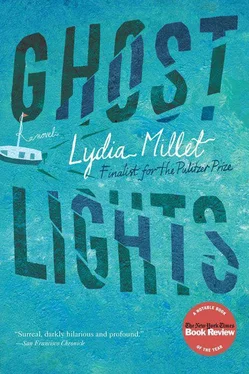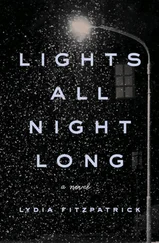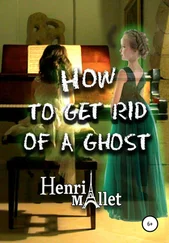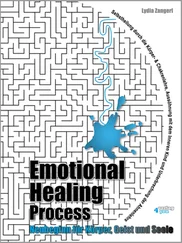Lydia Millet - Ghost Lights
Здесь есть возможность читать онлайн «Lydia Millet - Ghost Lights» весь текст электронной книги совершенно бесплатно (целиком полную версию без сокращений). В некоторых случаях можно слушать аудио, скачать через торрент в формате fb2 и присутствует краткое содержание. Издательство: W. W. Norton & Company, Жанр: Современная проза, на английском языке. Описание произведения, (предисловие) а так же отзывы посетителей доступны на портале библиотеки ЛибКат.
- Название:Ghost Lights
- Автор:
- Издательство:W. W. Norton & Company
- Жанр:
- Год:неизвестен
- ISBN:нет данных
- Рейтинг книги:5 / 5. Голосов: 1
-
Избранное:Добавить в избранное
- Отзывы:
-
Ваша оценка:
- 100
- 1
- 2
- 3
- 4
- 5
Ghost Lights: краткое содержание, описание и аннотация
Предлагаем к чтению аннотацию, описание, краткое содержание или предисловие (зависит от того, что написал сам автор книги «Ghost Lights»). Если вы не нашли необходимую информацию о книге — напишите в комментариях, мы постараемся отыскать её.
How the Dead Dream
Ghost Lights
Ghost Lights
Ghost Lights — читать онлайн бесплатно полную книгу (весь текст) целиком
Ниже представлен текст книги, разбитый по страницам. Система сохранения места последней прочитанной страницы, позволяет с удобством читать онлайн бесплатно книгу «Ghost Lights», без необходимости каждый раз заново искать на чём Вы остановились. Поставьте закладку, и сможете в любой момент перейти на страницу, на которой закончили чтение.
Интервал:
Закладка:
Still it shone.
At the moment he would actually be comforted, he realized, to run into the bohemians. He knew they were real. The way they got on his nerves would be a reassurance at this point, make the world more solid. With the bohemians complaining and bickering he was not, finally, far from all that he knew. It was too early for them now, however. Unlike the Germans they did not rise with the sun. But later they would be up, drinking their black coffee or espresso or whatever it was they drank. . it would be good to see them. Ground him. Something like that.
Until then, pass the time — past the dreaminess, how it unsettled him — maybe he should lie down by the pool.
There were clean white towels in a cart on the deck, beneath a blue-and-white-striped awning. He helped himself to two, then another. He lay down on a chaise and covered himself with them.
•
“Excuse me. Sir?”
Coming awake again he realized the sun was higher in the sky but hidden, shedding a cold metallic light from behind the grayness. It was overcast. The towels had fallen off him and he was shivering. He sat up, dizzy. Wretched.
“Sorry, sir.”
“Sleeping.”
“I apologize. But they said you are looking for me.”
Hal stared at the interloper. It was the man raking sand. The unreality. . as though he would look for this man, as though he went around looking for sand-rakers.
“Who?”
“The manager. Mr. Lindley, right? My name is Marlo.”
It was a fog. He sat tiredly on the side of the lounger. Marlo. Yes.
“Right! I was looking for you. Before the armed forces.”
He leaned down, wanted to touch the water in the pool and splash it on his heavy face, but then the edge was further than he could reach. He let the arm fall, defeated.
“He said you wished to talk to me?”
“I was trying to find Thomas Stern. You worked for him.”
“You are his lawyer?”
“Lawyer? Never. Friend — friend of the family.”
“Please. Come with me.”
Hal stood up unsteadily.
“Please. This way.”
He was missing his belongings. What had he done with them? Wallet in the back pocket. Otherwise. . he felt unmoored. He was floating. Why not: follow some guy named Marlo.
They went down a path from the pool, through a gate and a yard where the sand-raker said something to another yard guy, an unshaven youth in overalls with a lawnmower. They trudged on through the service area, where guests were not usually welcome, past bags of fertilizer on a pallet, ladders against a wall, rusty tools on a bench, boats turned upside-down and equipment under a tarp. Maybe it was the lack of sleep, but he had to watch his feet to keep from stumbling. Needed something.
A Bull Shot, was what came to him — he needed a Bull Shot, beef broth, vodka and a shot of Tabasco. His mother used to drink them. During a certain era she drank Bull Shots and served cocktail sausages.
“Here. It takes ten minutes, maybe fifteen. OK?”
He must have nodded because now Marlo wanted him to help push the boat off the sand, a small boat with an outboard motor. The man was already wading out, the bottom of his white pants swirling around his legs in the water. In the boat, nothing but wooden benches — no padding and no shade.
He didn’t have it in him to object, so he bent down and grabbed the back of the boat and heaved. Then he took his shoes off and stepped into the water after it — his pant legs were soaked right away and he sat down heavily on the back bench, feeling the wet material and the grains of sand against the skin of his calves. Marlo was beside him, pulling the cord, so he groped his way to the center bench.
Head spinning, he was on the water. Again.
Neither of them said anything over the noise of the motor and the thump of the prow against the waves. Hal felt thirsty — a throat-cracking thirst came on him in an instant. Afraid his throat would crack he found himself looking under the rough benches for water bottles — anything! — and seeing nothing but an oar and a plastic bucket, he closed his eyes.
His mother stood at the corner of a bar they had in the rec room in the basement, a basement that opened with sliding doors onto the backyard patio. He remembered trays of the miniature sausages in pastry wrappings, toothpicks stuck in them with colored flags of cellophane, flags of yellow and orange. But something thirsty about it — the dry air. . his father in a Hawaiian shirt, standing over the barbecue.
“Nadine, dear. Here. Have a Bull Shot,” he heard his mother say. Nadine was the lady from across the street. She was getting a divorce, he had heard his parents whispering about it. She wore bright, aqua-colored eyeshadow, far too much all the way up to her eyebrows, which Hal, nine at the time, fixated on until his mother told him to stop staring. Hal had firmly believed the eyeshadow was the reason for the divorce. He remembered his conviction on this point, asking his mother why Nadine didn’t just stop wearing it.
Even now he recalled the texture of the eyeshadow, how it made him notice the lines beneath the turquoise sheen on the lady’s skin, their fine cross-hatchings.
Susan had gone with him to the funeral — his mother’s, not the eyeshadow lady’s — shortly after their own wedding, twenty years later. He had held her hand at the side of the grave, which was surrounded by a carpet of something like AstroTurf. He held her hand and felt this contact was the armor worn by the two of them. Armor was what it was, the pair bond, marriage: something enclosing them that offered protection. But it was not metal, finally, it was far too flimsy. . at different moments in a life you had these companions, blurring around you like figures in stop-motion photography: mother, father, friends of his youth, wife, daughter. Gone.
Not one of them forever.
He was riveted by the pain of this flashing away, this dimming. He would die from it, die from being alone.
He opened his eyes.
“I am so thirsty,” he said to Marlo over the engine noise, in the vain hope he might be able to help. But the man only nodded and smiled, probably no idea.
Then they were sputtering to a slow glide. Glancing down he saw the boat was over the shallows again, simple sand beneath them through the light water. No coral, no seaweed. He turned around — he had spent the whole ride facing backward, facing where they’d come from. There was a small beach, some trees — an island, he guessed. A small island.
“Where are we?” he asked Marlo.
“Mr. Tomás’s property,” said Marlo, as the boat cruised in and the hull scratched over the bottom.
Hal looked up the beach. He could make out what seemed to be piles — piles of what he did not know.
“You go,” said Marlo, and gestured.
He had no idea what he was doing here but got out of the boat anyway, waded up the slope of the beach still clutching his shoes. He tried to cross the sand barefoot but there were sharp things in it, little sticks or twigs or something, that hurt him. He had to stop, wavering, hopping to keep his balance as he put the shoes on. Off balance, he almost toppled. The sensation of his wet feet inside the shoes was unpleasant: cold toes and gritty sand.
All he could do was walk toward the piles. Nowhere else to go; there was nothing else here. He felt a prick of fear. Maybe Marlo had brought him out here to kill him. Why? A good question. Still. Hal was middle-aged, exhausted and weak — a natural victim. It was just the two of them.
He turned around and gazed back at the boat, where Marlo stood cupping his mouth with his hands. He was lighting a cigarette.
Up the beach a little further were the collapsed walls of a building, its concrete foundation. What was Hal supposed to be noticing, for chrissake? He was too tired for games. Tired and stupid. He wasn’t a forensics investigator. He was no Sherlock Holmes. He noticed nothing, did not even want to have to pay attention. Splintered plywood, chunks of plaster, waterlogged Sheetrock with yellow stains browning at the edges. That was it.
Читать дальшеИнтервал:
Закладка:
Похожие книги на «Ghost Lights»
Представляем Вашему вниманию похожие книги на «Ghost Lights» списком для выбора. Мы отобрали схожую по названию и смыслу литературу в надежде предоставить читателям больше вариантов отыскать новые, интересные, ещё непрочитанные произведения.
Обсуждение, отзывы о книге «Ghost Lights» и просто собственные мнения читателей. Оставьте ваши комментарии, напишите, что Вы думаете о произведении, его смысле или главных героях. Укажите что конкретно понравилось, а что нет, и почему Вы так считаете.












